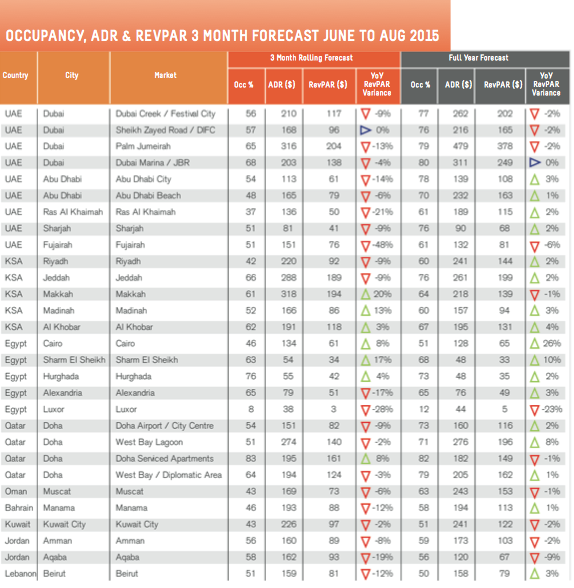Taking a look at some of the MENA region’s rolling highlights and YoY RevPAR variance percentages from Colliers International with a commentary from Filippo Sona.
Hot topic: Shariah Compliant Hotels- A spiritual Investment
We often hear about Sharia complaint hotels, however the term is not often fully defined. In order for the hotel investment industry to fully understand what is needed to develop a Sharia compliant hotel, it is important to consider a number of different factors including design, operation and brand and financial systems, all of which need to be aligned with Sharia rules and principles.
The terms Sharia compliant tends to be used inappropriately, often referring to a hotel that does not serve alcoholic beverages, however it is much more than this.

To provide a framework for the hotel industry, Sharia Compliant Hotels can be divided into three categories: “Dry hotels” which do not serve any alcoholic beverages within their premises; “partially compliant” hotels which in addition to dry hotels have some separate facilities for men and women; and “fully compliant hotels”.
As hotel development is a science, evolving with generations and responding to demand drivers, developing fully compliant hotels faces a number of challenges particularly in design and operation. For example, when we look at the design of a hotel room, the bed and toilet should not face the Qibla. When it comes to operations, a number of other factors should be considered, such as the exclusive employment of Muslims, and appropriate guest entertainment. In some instances, when there is the segregation of sexes with separate cafes and restaurants, and only married guests are permitted to occupy the same bedroom, hotels need to look closely at capacity management. In some cases, they may lose revenues by turning away demand that does not match the room available, such as when a floor is dedicated to a particular type of guest, for example women or unmarried individuals.
In the competitive and fast-paced hotel industry, branding is also essential for the success of a hotel. For the consumer and for prospective employees, a brand is a perceptual construct – it exists in people’s minds and in the hotel business is a proxy for service and quality level. A hotel brand is a means of identification and differentiation, and an assurance of the delivery of a known product/service. Above all else it communicates a promise.
A hotel brand name is part of the process of giving tangibility to what is essentially intangible, providing a ‘shorthand’ method of establishing a particular property’s quality by giving the customer important information about its product and service, sight unseen. But how many of the global brand and brand standards are really Sharia compliant? Arguably the likes of Shaza Hotels and Rayhaan by Rotana are the best known brands in the region which strive to comply with the rules and principles of Sharia law.
Beyond spirituality, the development of a Sharia compliant hotel is an investment which has to be sustainable. The success of the investment and its operations depend on whether there is sufficient demand to maintain it, and on whether or not the travelers who are demanding Islamic hotels are willing to pay a premium to access Islamic hotel facilities and services.

Hot spots:



































































